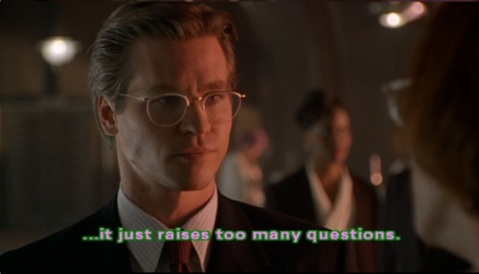ajp4mgs
Super Freak
- Joined
- Jul 10, 2017
- Messages
- 2,305
- Reaction score
- 1,672
And honestly - how on earth could that force ghost skill possibly be learned if so few Jedi have ever done it?
You'll have to watch the CW cartoon to see how it started. I'm guessing that you're not interested in doing that, though.

And again, I'm not saying that all of this including force projection couldn't be made to work, and work well, and movingly. It's just as-presented is what I mean.
The Force projection didn't/doesn't work for you, and you have your own very legit reasons why. I can appreciate that. But we've been focusing on the "how" it would work, while I care much more about the "why" it was used. The projection is a punctuation to the whole Luke narrative in TLJ.
Luke had wanted to become what his father could've been if not for falling into the trappings of the Dark Side. He succeeded at that from ROTJ onward, but only to find himself eventually echoing the mistakes of his mentors, Obi-Wan and Yoda. He concluded that Jedi hubris was largely to blame because they treated the Force as almost a proprietary thing.
Luke decided to exile himself in an effort to end the Jedi (and thereby the Jedi/Sith dynamic). That was way more palpable to me than "Luke is sulking because his nephew turned on him" (which is all we were told in TFA). All of the scenes with Rey in TLJ were meant to bring Luke back (figuratively) *slowly* so that his exile wouldn't come across as knee-jerk and lacking emotional maturity.
When Rey got through to Luke, he reconnected with the Force. He then saw/felt his sister in serious peril. He rushed out to go back with Rey, only to find her connecting with Kylo. Rey leaves, but Yoda returns to complete Luke's rebound. Ultimately, Luke uses his complete mastery of the Force to help save people, even from across the galaxy, without shedding any blood. It was used to return Luke to the principles and mindset he'd evolved to at the end of ROTJ.
The logistics of Force projection (much like the logistics of any Force ability) don't matter to me as much as the fact that Luke Skywalker used it to end up being the absolute epitome of what Yoda had taught him (and us) that a true Jedi should be.
"You will know. When you are calm, at peace. Passive. A Jedi uses the Force for knowledge and defense, never for attack."
"A Jedi must have the deepest commitment, the most serious mind. This one a long time have I watched. All his life has he looked away . . . to the future, to the horizon. Never his mind on where he was. Hmm? What he was doing. Hmph. Adventure. Heh! Excitement. Heh! A Jedi craves not these things."
It's been almost two years and Pablo's still working on it.
I'd prefer if he never bothers to attach specifics to it. Much like the Force lightning that played a major role at the end of ROTJ, it's a power that hadn't been seen before, and one that can elicit tons of questions. Is Force lightning something that can be used at any time? Is it limitless, or does it ever need to be "recharged?" Why would Palpatine teach it to Dooku, but not to Vader? Does it weaken the user, or can he basically be a lightning-firing machine?
I agree with TaliBane that Yoda nuking trees 35 years later is problematic but I also agree with ajp that Force ghosting is a learned skill.
I'll take it!



















 Are there parameters for what's "too far" (deep sea divers certainly know what depths and times create danger/bends/blackout)? Did Luke know these - and if so, how? How could he know if that danger existed if he invented the idea of FP?
Are there parameters for what's "too far" (deep sea divers certainly know what depths and times create danger/bends/blackout)? Did Luke know these - and if so, how? How could he know if that danger existed if he invented the idea of FP?